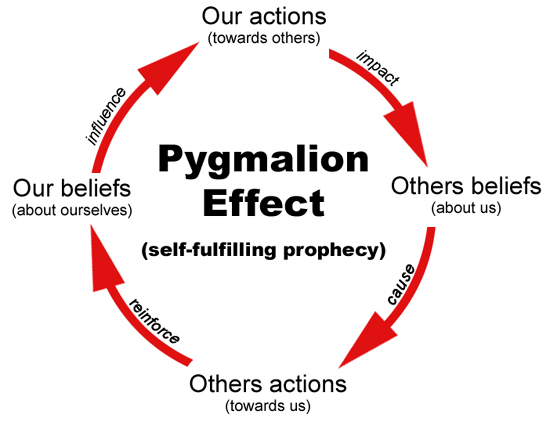
About a year ago, I took social psychology. We studied something called the Self-fulfilling Prophecy. Our actions unconsciously, influence everything.
Any positive or negative expectation about circumstances, events, or people that may affect a person's behavior toward them in a manner that causes those expectations to be fulfilled.
For example:
An employer who, expects the employees to be disloyal and shirkers, will likely treat them in a way that will elicit the very responses he or she expects. Another diagram should help with this for all of you "VISUAL" learners.
I am a firm believer in this myself. Have you ever met someone you just "didn't like," so you act in a way that favors your dislike for a person? It happens all the time. People judge people and all unconsciously, you behave in a way to prove you are right with your beliefs of that person.
So it is easy to assume that in order to make a better life for everyone, is to obviously say and think all "good" things about people right?
I bring this topic up because of a lesson we learned in class about different learning styles. Then this topic jumped out at me. So the question is, if this could be used to make work less stressful for employees and employers, will it work in a classroom?
When I was studying this subject, I do remember the statistics for it. The study was done in an elementary class room. The students took a test and were placed in 3 different classes. The teacher was told that Class A: Smart class, Class B: The less smart class, and Class C: no information was provided to the teacher. The children were just divided up into those 3 classes at random, and the test they took was not significant to which class they came in. It turns out, in after a test in the beginning of the school year vs the end of the school year, Class A had the better scores than Class B, who had relatively lower scores, and Class C, test scores were pretty averaged. The teacher was then interviewed and could not think of why this happened if the same lesson plan was taught to all three classes the same. Could this be because of the self-fulfilling prophecy?


I cannot agree more with this post. I do believe the way others treat us does affect us, our self-perception, and attitudes to a degree, especially for impressionable children. The study you posted did not surprise me at all, and even though 25% is below half of the time, it is still significant in my opinion. Throughout my life as a student, I feel I have performed better in the classes in which I felt accepted and respected by my teachers.
ReplyDeleteFor instance, I did well in my friendly, understanding AP Biology teacher's class. She treated us students like young, responsible adults, and taught us a boatload of crammed material in a way we could absorb the information and feel confident about it.
However, I didn't do as well in my intimidating Honors Algebra II teacher's class, who became impatient whenever someone asked a question, and almost constantly had a look of disdain on her face. She even announced my grade in front of the class (I had a great grade at the moment due to extra credit) and I felt so embarrassed and pressured to keep doing well, my grade dropped. It was by far the worst class of my life, and I still attribute that to her attitude.